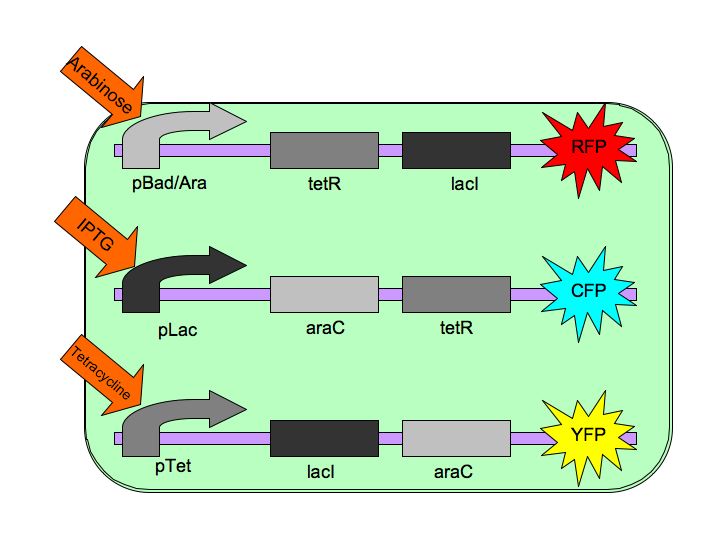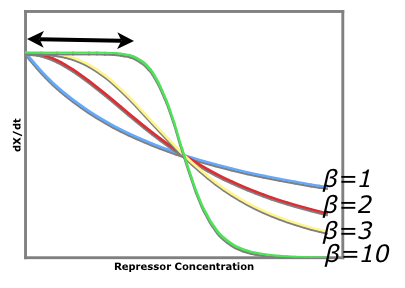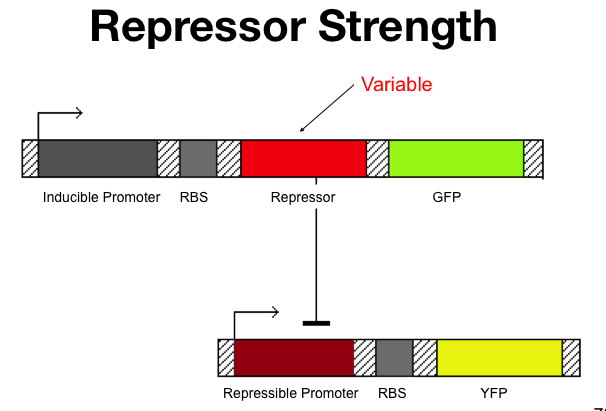Tristable
From 2007.igem.org
(Difference between revisions)
| (17 intermediate revisions not shown) | |||
| Line 1: | Line 1: | ||
| + | __NOTOC__ | ||
<!-- | <!-- | ||
| Line 103: | Line 104: | ||
<!-- PLACE CONTENT IN HERE--> | <!-- PLACE CONTENT IN HERE--> | ||
| + | |||
| + | |||
| + | '''Click on the title to learn more about each section.''' | ||
| + | |||
| + | |||
| + | |||
=[[/Intro to Tristable | Tri-Stable Toggle Switch]]= | =[[/Intro to Tristable | Tri-Stable Toggle Switch]]= | ||
| - | [[Image: | + | [[Image:Tristable_Toggle_Switch_2007.jpg|thumb|right]]A trinary memory unit. A genetic circuit. A proof of concept. Here is the man-made architecture of the switch and the natural context of our parts. |
| + | |||
| + | |||
| + | |||
| + | |||
| + | |||
| Line 112: | Line 124: | ||
=[[/Modeling | Tri-Stable Model]]= | =[[/Modeling | Tri-Stable Model]]= | ||
| - | While Gardner et al created a mathematical model and a genetic switch in the Bistable paper, one was not used to design and improve upon the other. Here we extend our model to the Tristable system and discuss what certain parameters mean in terms of DNA and Proteins, Production | + | [[Image:beta values.png|thumb|right]]While Gardner et al created a mathematical model and a genetic switch in the Bistable paper, one was not used to design and improve upon the other. Here we extend our model to the Tristable system and discuss what certain parameters mean in terms of DNA and Proteins, Production, Repression, etc. |
| + | |||
| + | |||
| + | |||
| + | |||
| + | |||
| + | |||
| + | |||
| + | |||
=[[/Testing Constructs | Testing Constructs]]= | =[[/Testing Constructs | Testing Constructs]]= | ||
| - | The dirty side of the switch. Testing constructs that will enable us to determine our constants in absolute terms and apply a mathematical basis to changes we make on the Tri-Stable Switch architecture. | + | [[Image:betaTest.png|thumb|right]]The dirty side of the switch. Testing constructs that will enable us to determine our constants in absolute terms and apply a mathematical basis to changes we make on the Tri-Stable Switch architecture. |
| + | |||
| + | |||
| + | |||
| + | |||
| + | |||
| + | |||
| + | |||
| + | |||
| + | |||
=[[/Appendix | Appendix]]= | =[[/Appendix | Appendix]]= | ||
| - | + | More information about where we are going and where we have been. | |
| + | |||
| + | |||
| + | |||
| + | |||
| + | |||
| + | |||
| + | |||
| + | |||
| + | |||
| + | |||
| + | <!-- | ||
=Tri-stable Toggle Switch= | =Tri-stable Toggle Switch= | ||
The Tri-Stable switch three distinct and stable outputs in response to three distinct inputs. These three inputs are three separate chemicals which will each induce one state of the switch. [[Image:Tristable_Toggle_Switch_2007.jpg|thumb|left|The Tri-stable Toggle Switch Architecture]] In order to achieve this goal, we are constructing three constructs, each of which consists of a repressible, constitutively-on promoter attached to two repressors. Specifically, our three constructs are: | The Tri-Stable switch three distinct and stable outputs in response to three distinct inputs. These three inputs are three separate chemicals which will each induce one state of the switch. [[Image:Tristable_Toggle_Switch_2007.jpg|thumb|left|The Tri-stable Toggle Switch Architecture]] In order to achieve this goal, we are constructing three constructs, each of which consists of a repressible, constitutively-on promoter attached to two repressors. Specifically, our three constructs are: | ||
| Line 298: | Line 338: | ||
[[Media:emailwithPatrickKing.txt]] | [[Media:emailwithPatrickKing.txt]] | ||
| + | --> | ||
<html> | <html> | ||
</td> | </td> | ||
Latest revision as of 22:38, 25 October 2007

|
|||||||||||||||||


